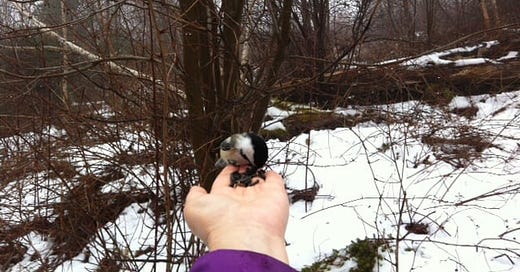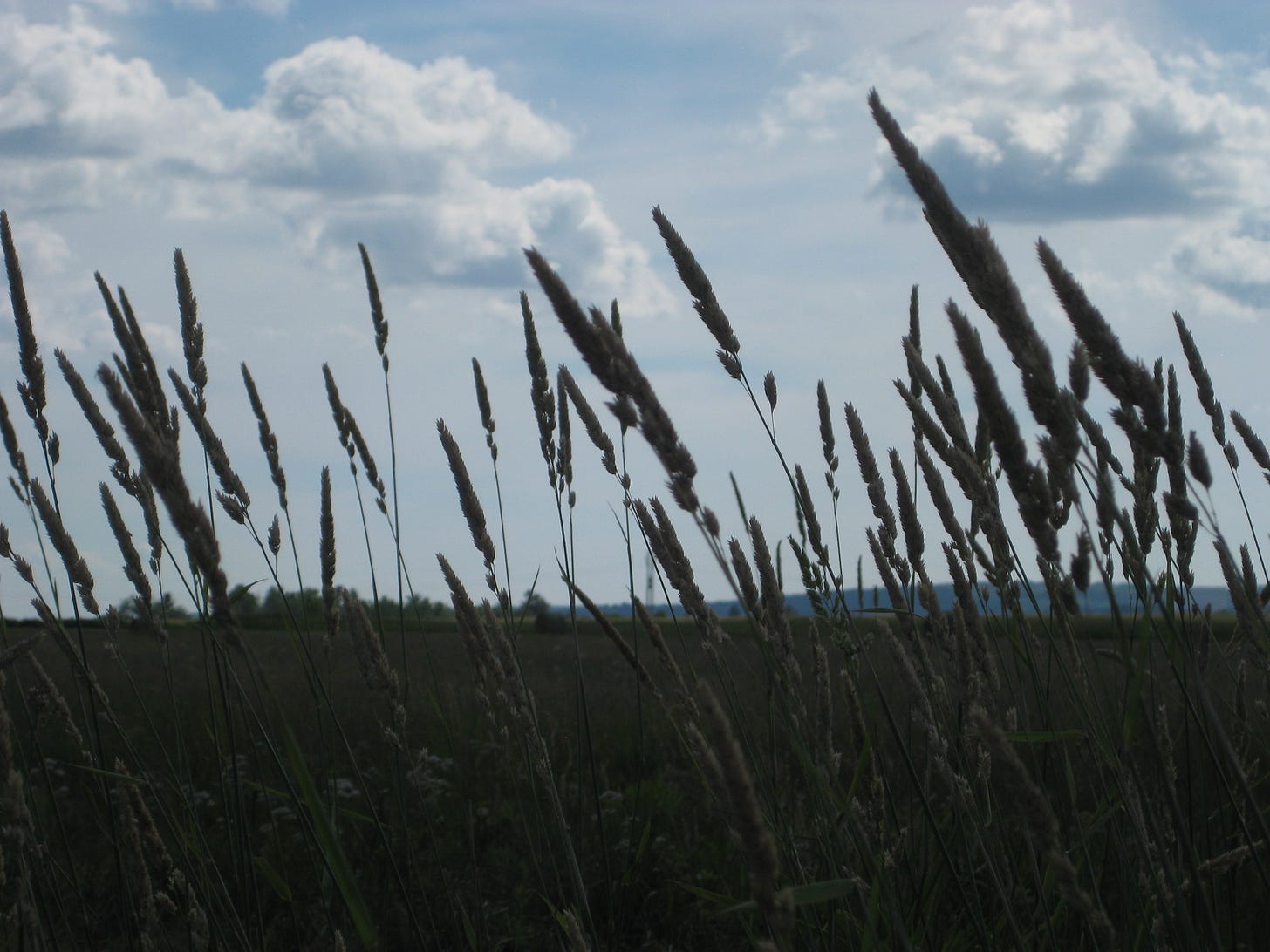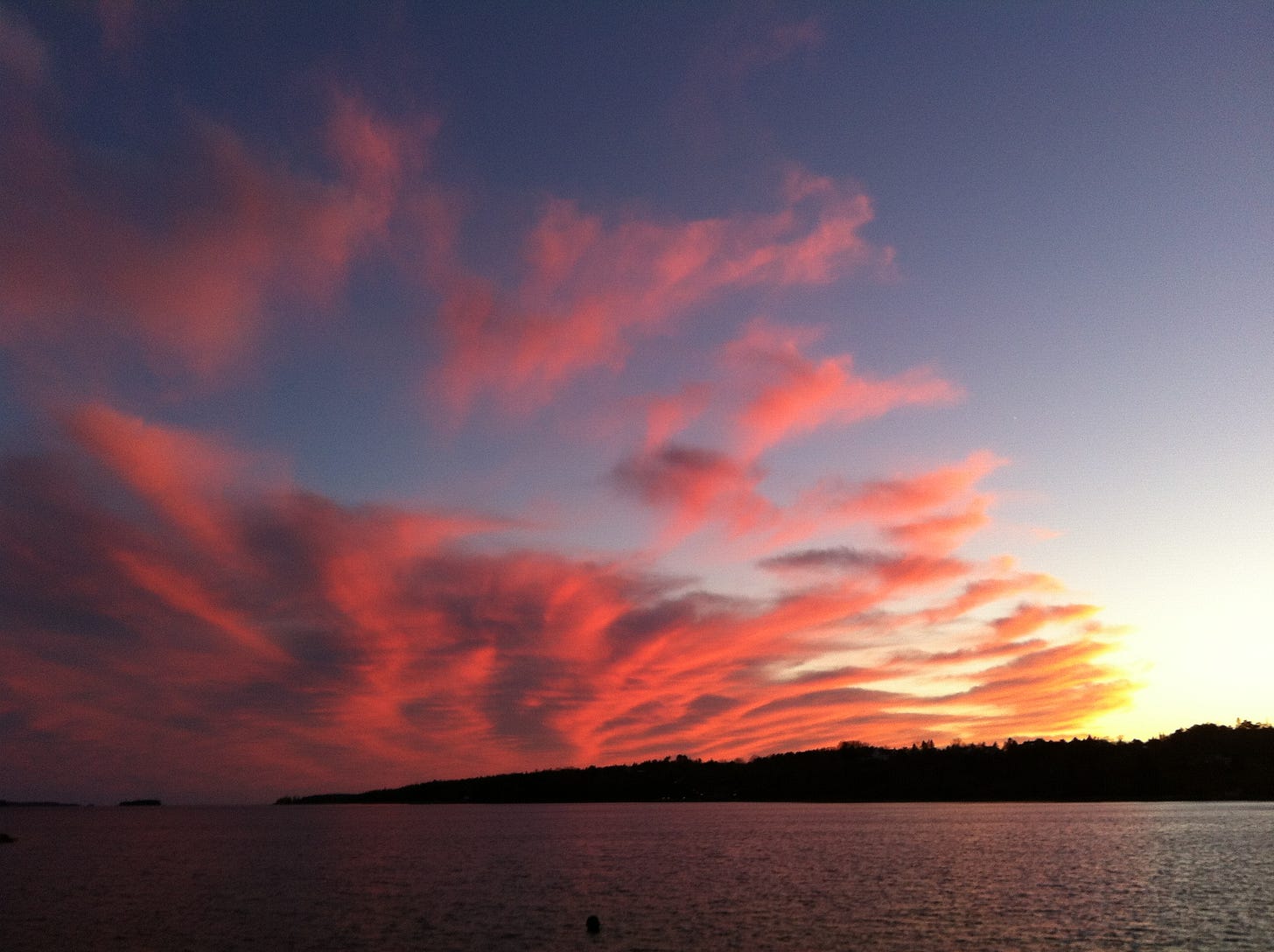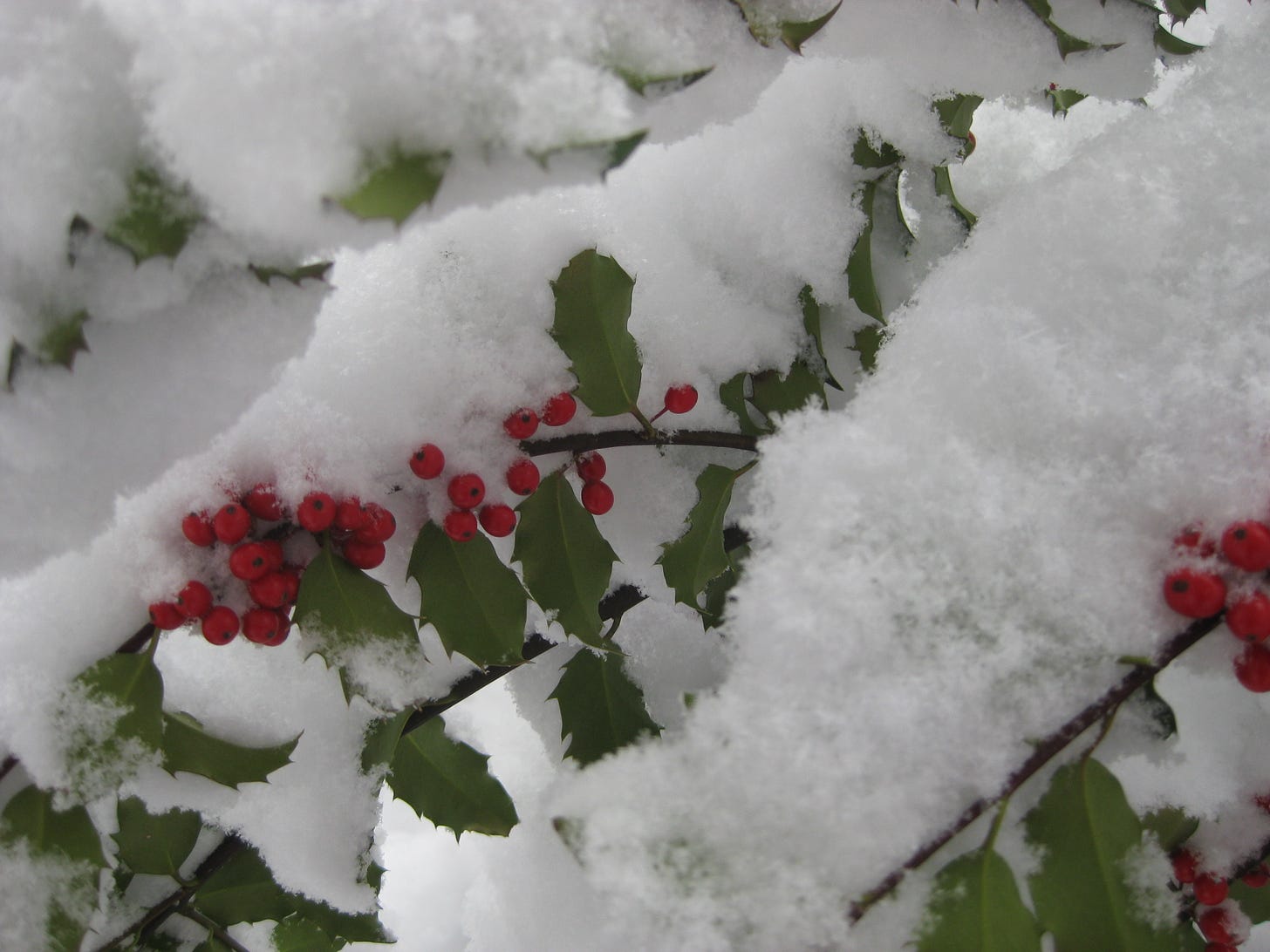Essay: The weight of grief and the return of the light
Some thoughts before I take a brief intermission
On the darkest day/ a chickadee lands softly/ liberating me
Photo: Linda Pannozzo
A few months ago, after the tragic of death of someone I had a great deal of respect for, I signed up for the funeral home’s “daily grief support” emails. At the time, it felt like a good thing to do since I was experiencing a general malaise that I thought might be rooted in a deeper sense of loss—one I was having a hard time shaking a stick at.
When I started talking to some close friends about it, they said they were feeling it too.
After signing up, I got an email at the same time every morning. I saved the ones that resonated in some way. This one is an excerpt from Twenty Boy Summer, Sarah Ockler’s debut novel. It’s definitely a sensation I’ve experienced over the years:
I wake up and forget just for a second that it happened. But once my eyes open, it buries me like a landslide of sharp, sad rocks. Once my eyes open, I'm heavy, like there's too much gravity on my heart.
The support email continues with a little explanatory note, “For longer than you expect, your loss will be your first conscious thought when you wake up each morning. It may be weeks, or months, or years. Then one day, out of nowhere, you will have another thought first. Do not feel badly. That is a milestone in your healing.”
When I look more closely at my plate-of-grief-with-a-sense-of-foreboding on the side, I know I can’t blame it all on the pandemic—a topic I will return to—though it does account for a disproportionate share of late.
Like all of us, I’ve experienced some losses that I would just chalk up to a life lived. The kind that comes with the death of loved ones, for instance. My father died of prostate cancer the year I turned 29, and just the other day, when I was listening to a tape recording of an oral history I did with him four months before he died, the sound of his voice created a tight lump in my chest and I momentarily lost my breath.
That was nearly 3 decades ago, and while the grief over losing my father has lightened over the years, there are moments when I can still be bowled over by it.
There is also grief about unresolved friendship fissures, and things that haven’t quite turned out as I’d hoped with regards to work or plans. I realize I’m not unique. I know we all experience this stuff to greater or lesser degrees.
I also can’t discount the grief that I think probably comes from inter-generational trauma. WWII was an incredibly ruinous event for both my parents. At eleven years of age, my mother not only lost her father in the war, but her family was forced to flee to a “cave” on the hillside when German soldiers occupied their house. My father, who was a cook on a submarine in the Italian navy, spent a year in a prisoner of war camp in South Africa, after surviving a British attack that sunk his submarine.
So, there was trauma in both my parents’ lives before immigrating to Canada. But interestingly, when I asked my mom many years ago about whether she was scared during the war, she said that life was pretty normal until her father was killed. They didn’t have access to the news, so she learned of his death by telegram. Today we are bombarded with news from every corner of the planet. Information overload puts it mildly.
Photo: Linda Pannozzo
Another grief support email arrives. This time the excerpt is from the 1974 science fiction novel by Philip K. Dick, Flow My Tears, the Policeman Said. The novel is set in a dystopian future of 1988, following a Civil War which led to the collapse of the United States' democratic institutions.
"The bird is gone, and in what meadow does it now sing?"
The email goes on to explain that how grief is made sense of often depends on religion and culture. “Finding out how others make sense of death during this time of grief can help you work through some of your own ideas and beliefs.”
One of the things that disturbed me most during the pandemic was how religious and cultural beliefs and rituals—the very things that often keep people from becoming unhinged in trying times—had become expendable. In the name of fear, many of the values that make us human were discarded.
We were fed an almost constant diet of fear—the belief that someone or something is dangerous, likely to cause pain, or is a threat. It was peddled by politicians, public health officials, and the media. I made it a habit of reading the articles I encountered that had the most fear mongering headlines, and more often than not, they were misleading and not borne out by the “facts” or the studies cited.
Why would anyone want to create such a fearful society?
While we all viewed and experienced the pandemic through our own personal lens and set of individual circumstances, for me, watching our society turn its back on what makes us human, turned out to be very disillusioning, to say the least.
“Fear is a bad advisor,” writes Italian philosopher Giorgio Agamben in his book about the pandemic, Where are We Now? He asks, “What is fear, into which people today seem to have fallen so deeply that they have forgotten their ethical, political, and religious beliefs?”
I don’t believe that transforming the country into a plague-ridden land, where we all look at each other as potential sources of contagion, is really the solution. The false logic is always the same: just as it was asserted that in the face of terrorism that freedom should be abolished in order to defend freedom, now we are told that life has to be suspended in order to protect life.
Agamben reminds us that our neighbour, who became a “possible agent of contagion,” was “first of all our fellow to whom we owe our love and support.”
It should be mentioned that when Agamben wrote the controversial essays that eventually became his book, it was still early on in the pandemic and didn't include what came later—the demonization and scapegoating of the unvaccinated—which was also based on irrational fear.1
Agamben writes about the “feeling of impotence” that defined the fear at the time, and how people would do anything to protect themselves “from the thing that threatens them.”
To greater or lesser degrees, we wore masks, stayed home, didn’t socialize, got vaccinated. But for many, this protection did not “reassure them,” writes Agamben. “On the contrary, [it] renders their impotence against the ‘thing’ even more palatable and constant,” he writes.
What Agamben is saying is that while those who are fearful seek reassurance from those recognized as possessing some authority, it doesn’t “get rid of the feeling of insecurity that accompanies fear.”
Evidence of the enduring and irrational effects of fear is that the same people who, during the height of the pandemic, trusted and followed the edicts of public health officials, seem unwilling or unable to trust them now when they recommend we have to learn to live with the virus, and that people need to manage their own level of risk.
Agamben writes:
Since fear precedes and forestalls knowledge and reflection, it is quite useless to try and convince the frightened with rational arguments and evidence; more than anything, fear denies them access to a reasoning process that preclude fear itself… Under the new biosecurity paradigm that is being implemented before our very eyes, the idea of citizenship has completely changed, and the citizen has become the passive object of medical treatment, controls, and of all kinds of suspicion. The pandemic has shown beyond doubt that citizens are being reduced to their bare biological existences.
Photo: Linda Pannozzo
Another grief support email, this time a quote by Pericles, the Greek politician and general during the Golden Age of Athens said: "[G]rief is felt not so much for the want of what we have never known, as for the loss of that to which we have been long accustomed."
I suppose this is what I mean when I say the pandemic was disillusioning. Ethics, and basic human values that I thought had a permanence, at least here in Canada, were cast aside in the name of safety and security. For instance, it was shocking to see how easily fear was able to convince people that it was necessary for loved ones to die alone, that the elderly should be isolated, and that it was ok to ignore how lockdowns and restrictions were affecting the young.
In a piece written early on, Arundhati Roy described the pandemic as a “portal” where things previously hidden were suddenly visible.
She writes:
The lockdown worked like a chemical experiment that suddenly illuminated hidden things. As shops, restaurants, factories and the construction industry shut down, as the wealthy and the middle classes enclosed themselves in gated colonies, our towns and megacities began to extrude their working -class citizens – their migrant workers – like so much unwanted accrual. Many driven out by their employers and landlords, millions of impoverished, thirsty people, young and old, men, women, children, sick people, blind people, disabled people, with nowhere else to go, with no public transport in sight, began a long march home to their villages. They walked for days… Some died on the way. They knew they were going home potentially to slow starvation… As they walked, some were beaten brutally and humiliated by the police, who were charged with strictly enforcing the curfew. Young men were made to crouch and frog jump down the highway… one group was herded together and hosed down with chemical spray.
Of course, here in Canada, lockdowns did not result in the societal upheaval that was experienced in India, but nevertheless, many suffered here too. And, the misery associated with COVID-19- the disease, or the response to it, was not randomly or equitably distributed. Apart from the elderly and those with numerous co-morbidities, who were at the highest risk of serious outcomes, the misery was concentrated disproportionately among lower socio-economic groups, who have a higher incidence of chronic disease. They also tended not to have the resources to buffer the stress that we were all being subjected to and weren’t paid to work from home like the professional classes were.2
We received almost daily dictates from public health about protecting the most vulnerable—that we all needed to “social distance,” wear masks, and get vaccinated—while the government sat on effective, federally authorized early treatments, that could have kept the most vulnerable out of the hospitals. They also did nothing to bolster an already overwhelmed health care system, one that successive governments have been in the process of dismantling. We are still being told we have an obligation to be healthy to protect this system.
Photo: Linda Pannozzo
Another grief support email, this time from Victor Hugo’s Les Misérables, "Great griefs exhaust. They discourage us with life. The man into whom they enter feels something taken from him. In youth, their visit is sad; later on, it is ominous."
Those who know me can attest that I have a tendency towards catastrophic thinking. It’s something I often joke about. I’m aware of it and realize that it’s not a beneficial state of mind. In fact, instead of being paralyzed by it, I always try to “feel the fear and do it anyway.” Years ago, I even went to see a therapist about this kind of thinking and she pointed out that it “keeps us bound” and that embracing risk is “saying ‘yes’ to the vitality of life.”
"We were promised sufferings. They were part of the program,” reads one of the grief support excerpts, this one from C.S. Lewis’ A Grief Observed.
I worry that our society as a whole is becoming catastrophically oriented. Everything has become apocalyptic.
Anxiety is everywhere. What is this doing to the children?
A few years ago, before the pandemic, I had already started taking breaks from reading the news because it had become so disturbing to read. Images were literally haunting me: reports of tens of thousands of bats dropping from trees like flies in Australia’s heat waves; thousands of pairs of Emperor penguins disappearing from Halley Bay, Antarctica’s second largest breeding ground; and stories of desperately hungry polar bears, who normally hunt from ice flows, stalking people in Labrador. The story that really winded me was the one of massive walruses plunging to their deaths from Alaska’s rocky and crowded precipices because of the disappearance of sea ice—their traditional haul out spots—another result of a changing climate.
The news is becoming a never-ending loop of horror, whether it’s about climate, nuclear war, food shortages, or pandemics.
How are we to find meaning and peace of mind in this harsh, horror-filled bombardment?
Near the end of Roy’s moving piece “Pandemic is a Portal” she writes:
Historically, pandemics have forced humans to break with the past and imagine their world anew. This one is no different. It is a portal, a gateway between one world and the next. We can choose to walk through it, dragging the carcasses of our prejudice and hatred, our avarice, our data banks and dead ideas, our dead rivers and smoky skies behind us. Or we can walk through lightly, with little luggage, ready to imagine another world. And ready to fight for it.
I’m ready to fight for another world.
But I don’t accept the one that’s being ushered in: where an affluent minority advances at the expense of the vast majority of the world’s population. I also don’t want the kind of technological progress on offer, with neurally interconnected, genetically and biologically enhanced lives, also known as trans-humanism. I also don’t want a world that’s increasingly segregated, polarized, and hate-filled; or one that doesn’t allow for forgiveness or redemption; or one in which we have become so fearful of each other that we accept the loss of our civil liberties and welcome the horrors of a dystopian bio-security state.
No, the world I’m going to be fighting for is one that values dialogue, recognizes the natural world is our life support system, and is committed to the truth.
One that is not based in death and darkness, but in light. Not based in fear, but in love.
Photo: Linda Pannozzo
In Italy, “green passes”—an indication of immunity status—were required in exchange for goods, services and/or access to certain premises or locations. Here we had the “proof of vaccine policy.” But once we learned that even the vaccinated could get and transmit the virus, the rationalization for the policy—that it offered substantial public benefit—no longer held water. It wasn’t effective at controlling the virus, and therefore the unnecessary encroachment on our civil liberties was unsupportable.
I know there might be readers who don’t feel my statements here are being qualified enough. But that is only because I don’t want to be repeating myself. If you are seeking further reading on the issues I’m raising, please refer to the following articles about the pandemic and our reaction to it. They are listed in the order in which they were published.
Why did the Canadian Civil Liberties Association Challenge Newfoundland and Labrador’s Travel Ban?
What’s the Deal with Ivermectin and COVID? An Interview with Dr. Edward Mills, Principal Investigator in the Together Trial.
Monoclonal antibodies, Nova Scotia’s ‘Unspent Ammunition’ Part 1
Monoclonal antibodies, Nova Scotia’s ‘Unspent Ammunition’ Part 2









The people in a Society have become so used to being told what to do and not to do and how to do it that they have lost the ability to rely on their own common sense and gut feelings. Yes, stay in the know and, if there's somewhere you can make a positive contribution, do so. Otherwise, LET IT GO--worrying only causes anxiety and fear and makes you less able to think or act clearly.
I like it, Linda, how you have interspersed photos of light and hope as a counterbalance to the mood of your article.
Happy New Year to All...find a slice of 'happy' in each of the next 365 days!
Beautiful, and brilliant, words and pictures.